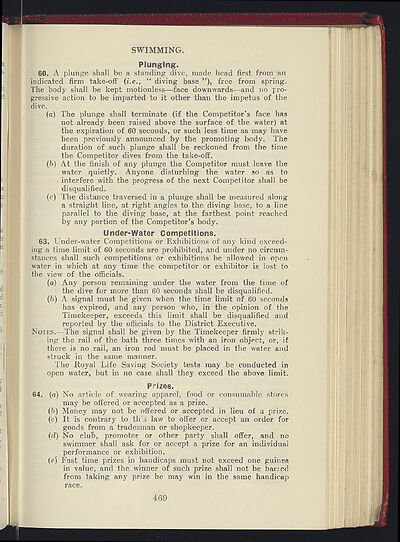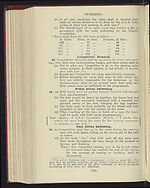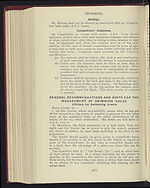1935-36
(517)
Download files
Complete book:
Individual page:
Thumbnail gallery: Grid view | List view

SWIMMING.
Plunging.
60. A plunge shall be a standing dive, made head first from an
indicated firm take-off (i.e., " diving base "), free from spring.
The body shall be kept motionless—face downwards—and no pro-
gressive action to be imparted to it other than the impetus of the
dive.
(a) The plunge shall terminate (if the Competitor's face has
not already been raised above the surface of the water) at
the expiration of 60 seconds, or such less time as may have
been previously announced by the promoting body. The
duration of such plunge shall be reckoned from the time
the Competitor dives from the take-off.
(b) At the finish of any plunge the Competitor must leave the
water quietly. Anyone disturbing the water so as to
interfere with the progress of the next Competitor shall be
disqualified.
(c) The distance traversed in a plunge shall be measured along
a straight line, at right angles to the diving base, to a line
parallel to the diving base, at the farthest point reached
by any portion of the Competitor's body.
Under-Water Competitions.
63. Under-water Competitions or Exhibitions of any kind exceed-
ing a time limit of 60 seconds are prohibited, and under no circum-
stances shall such competitions or exhibitions be allowed in open
water in which at any time the competitor or exhibitor is lost to
the view of the officials.
(a) Any person remaining under the water from the time of
the dive for more than 60 seconds shall be disqualified.
(b) A signal must be given when the time limit of 60 seconds
has expired, and any person who, in the opinion of the
Timekeeper, exceeds this limit shall be disqualified and
reported by the officials to the District Executive.
N
OTES.
—The signal shall be given by the Timekeeper firmly strilc-
ing the rail of the bath three times with an iron object, or, if
there is no rail, an iron rod must be placed in the water and
struck in the same manner.
The Royal Life Saving Society tests may be conducted in
open water, but in no case shall they exceed the above limit.
Prizes.
64. (a) No article of wearing apparel, food or consumable stores
may be offered or accepted as a prize.
(b) Money may not be offered or accepted in lieu of a prize.
(c) It is contrary to th'
,
,i law to offer or accept an order for
goods from a tradesman or shopkeeper.
(d) No club, promoter or other party shall offer, and no
swimmer shall ask for or accept a prize for an individual
performance or exhibition.
(e) Fast time prizes in handicaps must not exceed one guinea
in value, and the winner of such prize shall not be barred
from taking any prize he may win in the same handicap
race.
469
4
Plunging.
60. A plunge shall be a standing dive, made head first from an
indicated firm take-off (i.e., " diving base "), free from spring.
The body shall be kept motionless—face downwards—and no pro-
gressive action to be imparted to it other than the impetus of the
dive.
(a) The plunge shall terminate (if the Competitor's face has
not already been raised above the surface of the water) at
the expiration of 60 seconds, or such less time as may have
been previously announced by the promoting body. The
duration of such plunge shall be reckoned from the time
the Competitor dives from the take-off.
(b) At the finish of any plunge the Competitor must leave the
water quietly. Anyone disturbing the water so as to
interfere with the progress of the next Competitor shall be
disqualified.
(c) The distance traversed in a plunge shall be measured along
a straight line, at right angles to the diving base, to a line
parallel to the diving base, at the farthest point reached
by any portion of the Competitor's body.
Under-Water Competitions.
63. Under-water Competitions or Exhibitions of any kind exceed-
ing a time limit of 60 seconds are prohibited, and under no circum-
stances shall such competitions or exhibitions be allowed in open
water in which at any time the competitor or exhibitor is lost to
the view of the officials.
(a) Any person remaining under the water from the time of
the dive for more than 60 seconds shall be disqualified.
(b) A signal must be given when the time limit of 60 seconds
has expired, and any person who, in the opinion of the
Timekeeper, exceeds this limit shall be disqualified and
reported by the officials to the District Executive.
N
OTES.
—The signal shall be given by the Timekeeper firmly strilc-
ing the rail of the bath three times with an iron object, or, if
there is no rail, an iron rod must be placed in the water and
struck in the same manner.
The Royal Life Saving Society tests may be conducted in
open water, but in no case shall they exceed the above limit.
Prizes.
64. (a) No article of wearing apparel, food or consumable stores
may be offered or accepted as a prize.
(b) Money may not be offered or accepted in lieu of a prize.
(c) It is contrary to th'
,
,i law to offer or accept an order for
goods from a tradesman or shopkeeper.
(d) No club, promoter or other party shall offer, and no
swimmer shall ask for or accept a prize for an individual
performance or exhibition.
(e) Fast time prizes in handicaps must not exceed one guinea
in value, and the winner of such prize shall not be barred
from taking any prize he may win in the same handicap
race.
469
4
Set display mode to:
![]() Universal Viewer |
Universal Viewer | ![]() Mirador |
Large image | Transcription
Mirador |
Large image | Transcription
| Games and sports in the army > 1935-36 > (517) |
|---|
| Permanent URL | https://digital.nls.uk/248715091 |
|---|
| Description | 'Games and Sports in the Army' was an annual publication produced by the British War Office between the 1930s and 1960s. This included the Second World War. It outlines the rules and regulations for games and sports played by members of the armed forces. It features names and photographs of team members, and examples of contemporary advertising. |
|---|---|
| Shelfmark | GWB.52 |

